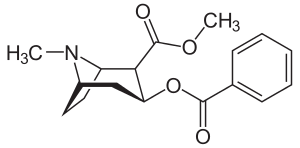Cocaine overdose
| Cocaine intoxication | |
|---|---|
 |
|
| Cocaine | |
| Classification and external resources | |
| Specialty | psychiatry |
| ICD-10 | F14.0 |
| ICD-9-CM | 305.6 |
| MedlinePlus | 000946 |
| eMedicine | article/813959 |
| MeSH | D019970 |
Cocaine intoxication refers to the immediate and deleterious effects of cocaine on the body. Although cocaine intoxication and cocaine dependence can be present in the same individual, these syndromes present with different symptoms.
Cocaine increases alertness, feelings of well-being, euphoria, energy, competence, sociability, and sexuality. Common side effects include anxiety, increased temperature, paranoia, restlessness, and teeth grinding. With prolonged use, the drug can cause insomnia, anorexia, tachycardia, hallucinations, and paranoid delusions. Possible lethal side effects include rapid heartbeat, abnormal heart rhythms, tremors, convulsions, markedly increased core temperature, renal failure, heart attack, stroke and heart failure.
Depression with suicidal ideation may develop in heavy users. Finally, a loss of vesicular monoamine transporters, neurofilament proteins, and other morphological changes appear to indicate a long-term damage to dopamine neurons. Chronic intranasal usage can degrade the cartilage separating the nostrils (the septum nasi), which can eventually lead to its complete disappearance.
Studies have shown that cocaine usage during pregnancy triggers premature labor and may lead to abruptio placentae.
Cocaine can be snorted, swallowed, injected, or smoked. Most deaths due to cocaine are accidental but may also be the result of body packing or stuffing with rupture in the gastrointestinal tract. Use of cocaine causes tachyarrhythmias and a marked elevation of blood pressure (hypertension), which can be life-threatening. This can lead to death from acute myocardial infarction, respiratory failure, stroke, cerebral hemorrhage, or heart failure. Cocaine overdose may result in hyperthermia as stimulation and increased muscular activity cause greater heat production. Heat loss is also inhibited by the cocaine-induced vasoconstriction. Cocaine and/or associated hyperthermia may cause muscle cell destruction (rhabdomyolysis) and myoglobinuria resulting in renal failure. Individuals with cocaine overdose should be transported immediately to the nearest emergency department, preferably by ambulance in case cardiac arrest occurs en route. According to the National Institute on Drug Abuse, approximately 5000 deaths occur annually in the US due to cocaine overdose.
...
Wikipedia
